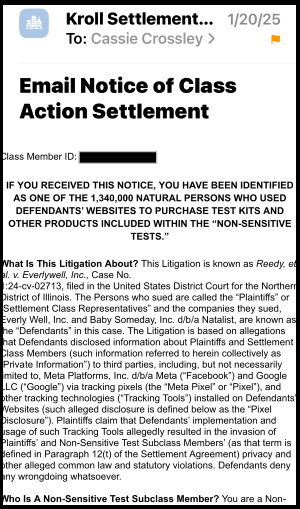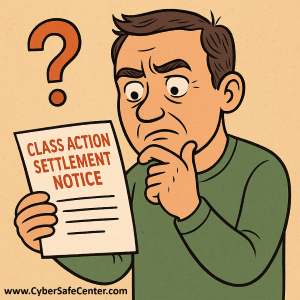If you’ve ever opened an email or letter about a class action settlement, your first thought might be that it is a scam. That reaction is understandable because so many fake offers circulate online today. But the truth is, many legitimate class action settlements exist, and some could mean real money for you if you qualify.
Here is an example I’ve received in email this year for a lab test I ordered in the past. The class member ID (which I blocked out) is a unique alphanumeric number assigned to an individual who is part of a legal case, such as a class action lawsuit. This ID is used by the settlement administrator to identify and track each person as they file a claim for compensation.

Recent real settlement examples include:
- AT&T agreed to pay $177 million related to two data breaches in 2024.
- Neiman Marcus and Panera Bread settled their own breach cases for $3.5 million and $2.5 million.
- Poppi, a prebiotic soda company, will pay $8.9 million to resolve claims about misleading marketing.
- Amazon has agreed to a $2.5 billion settlement as I wrote in this article.
Despite these legitimate cases, most people ignore notices. The Federal Trade Commission reports that only about 4 percent of consumers who receive settlement notices actually file a claim. That hesitation often stems from fear of scams.
When you ignore a legitimate class action notice, you usually remain part of the case but do not receive any payout. The company’s liability is reduced while you walk away with nothing. I personally haven’t responded to most of the settlement notices I’ve received so I need to do better about that in the future.
How to Verify a Notice
- Search for the case name online and add the words “settlement website.” Avoid clicking links or scanning QR codes in the notice.
- Look for official documents or filing information that matches a court record.
- Check trusted sites such as ClassAction.org or TopClassActions.com to confirm legitimacy.
- Never pay a fee or provide bank details. Real claims may ask for an address or email but never for your Social Security number or payment.
- Contact the law firm or claims administrator using independently verified contact information.
Class actions are one of the few ways ordinary consumers can hold large corporations accountable. Scammers might try to trick you, but ignoring every notice can mean losing legitimate compensation. Always verify before you delete.
